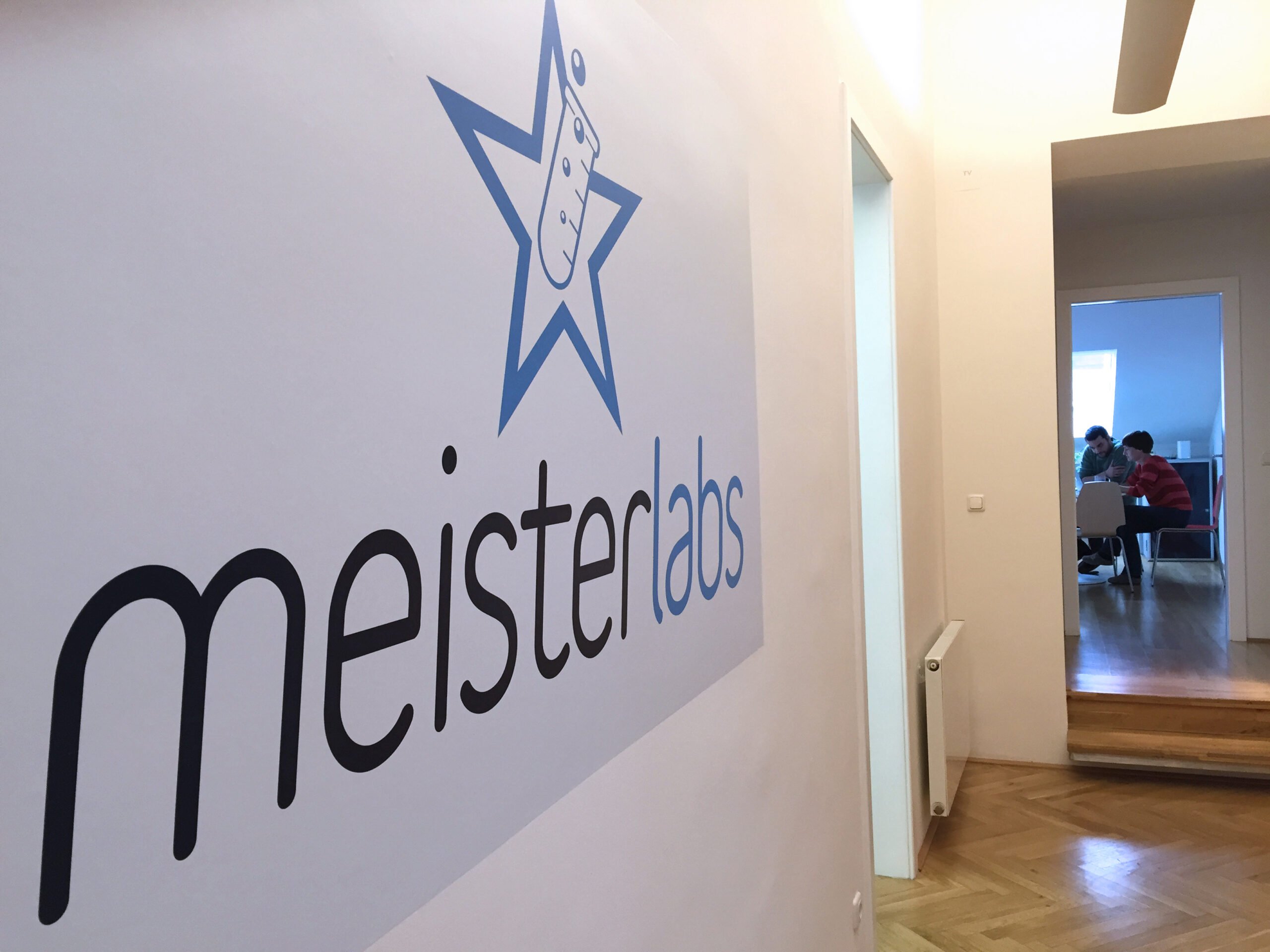Aside from shining a light on some of Europe’s finest bootstrapped technology companies, we’ve also kicked off the ‘Startup Spotlight’ series featuring relatively under-the-radar but interesting European tech startups on a weekly basis.
This time we shine a light on MeisterLabs, a software company based in Munich, Germany and Vienna, Austria. It is primarily known for collaborative mind mapping and brainstorming solution MindMeister but also offers an agile task management tool called MeisterTask.
Here's a Q&A with Michael Hollauf, co-founder and managing director of MeisterLabs.
tech.eu: How could you best describe MeisterLabs and what you're trying to achieve with your flagship products, MindMeister and MeisterTask, in just a few lines?
Michael Hollauf (pictured right): We were one of the first Software-as-a-Service companies in Europe, the term 'SaaS' didn’t even exist back then. Google had just acquired Writely and turned it into what is now Google Docs. We were also using MindManager, at the time the only serious mind-mapping software.
While using Google Docs – a collaborative word processing tool – and MindManager – a non-collaborative brainstorming tool – at the same time, we thought it might be a good idea to combine the two. So the idea behind MeisterLabs and our products is really the frictionless creativity.
We wanted something to reach the users quickly wherever they are. We did the first tests, had a prototype, and then we have send invites to a few hundreds of friends. Their invite made it possible of course to invite ten friends of their own. Within a day, we had 1,000 users.
I guess it was growth hacking avant la lettre. Today there are 3.5 million users of MindMeister.
MeisterTask continues on that goal of frictionless creativity and frictionless collaboration with other creative people. It is an online collaboration and task management tool that turns brainstorm into actions. Brainstorming alone is not enough, you have to be able to bring it to the real world.
What's the killer feature / magic sauce i.e. the one thing that differentiates both products the most from those of your competitors in your space, in your view?
I would say it’s the simplicity. You need to focus on the most important things, keep it small, keep it simple and make it look nice. Our three keywords are usability, simplicity and design. You should not scare the user with too much stuff. We have always focused on usability and simplicity.
In terms of magic sauce for mindmapping as a creativity tool - it’s the fact that you are working with both the left and the right side of your brain – the logical side and the creative, visual part. Every study shows that connecting both together makes people more productive. When you do that, you get that flash of insight. People who use MindMeister report to us that they can really feel that they are having productive brainstorms, which is great.
With MeisterTask we take you one step further, because brainstorming is nice, but where do you go from there? Your mind map makes you start your project, but until MeisterTask you had to switch to a different system once the project starts. That is why we integrate MindMeister with MeisterTask.
How did you meet your co-founder and what were you up to before starting MeisterLabs?
We were working together, but we were doing the same job from different locations. I was in London, he in Vienna. Originally, we started an outsourcing company – with developers in Romania - and out of that grew MindMeister. We have a high tolerance for each other and that is highly important. I don’t panic when he does not answer his emails quickly enough for example (laughs).
How much funding have you raised, and do you have any plans to raise more? If you've bootstrapped the business so far, would you like to keep doing that or was that out of necessity?
We have business angels in MeisterLabs, but for the past seven or eight years there has not been any additional funding. We have been profitable for five years now. We have not funded MeisterTask externally, but I would estimate we have spend 1.5 million euros on the development of it.
Sometimes we think about a big B round, but then we always discuss what we could do with the money raised. We are asking ourselves if it makes any sense. Of course we could hire more developers and bring out other products more quickly, but on the other hand I think scarcity makes you focus on what is really necessary.
If we do it, it’s probably to add more marketing power, to really go up against the Trello’s and the other big, funded collaboration tools.
It also depends on what happens with MeisterTask, how much traction we see. The worst thing for a company is stagnation. You shoud always have your eyes on the next step. If that means changing our strategy, we are willing to do so.
What is your business model - or your future plans to monetise if you haven't yet settled on one? Has your thinking on business model evolved a lot since the start of the company?
We use a freemium SaaS model. You can use MindMeister for free with certain limitations. I know there are discussions about freemium – whether to have a free plan or not, but I like to be nice to people in a sense that I want them to feel good about MindMeister.
I always think that feeling good about a product or a company is a good reason to pay. It is better if the user understands why a certain feature has to be paid.
We did evolve in our thinking about the business model. We used to have monthly plans, now six-month plans. The thinking was that mind mapping is infrequent, you do it before the start of a project. In the monthly program, they used the mindmaps once at the beginning of a project and they were off again. With the six-month plan, we encourage them to come back for the next project – and get a better monthly plan.
It has paid off for us so far. With MeisterTask it is clear that – as a newcomer in this space - we had to give away a lot for free. It is hard to get a userbase if you charge right away.
What are the company's plans for the next 3 to 6 months? (expansion, adding markets/languages, new features?) And what do you hope to have achieved in 12 to 18 months?
MeisterTask has just launched, but the real work starts now: getting feedback, implementing feedback, improving integration with MindMeister. And finding our space. In the next 12 to 18 months, we hope to have MeisterTask out there.
We hope it will be more popular, a big user base with paying users, generate revenue and publicity. And then we take the next step for the company and launch a third product. We have always thought about a suite of products. We have ideas about that third phase, we have ideas about products that would complement nicely. Stay tuned (laughs).
What are your thoughts on the Munich and Vienna tech startup ecosystems (funding landscape, government support, cost of living/starting up, etc)?
At the moment we are working from Vienna and from Munich at the same time. Mainly because of private reasons. Till married a German girl and I am Austrian and my wife is Irish, but she did not like Munich. Vienna is the bigger location for MeisterLabs, because here we hired people.
It adds complexity of course, but it certainly is not a problem in the daily business. He comes over for two or three days every second week. Munich and Vienna is 4-hour train ride, on which he can work in peace.
The startup ecosystem in Vienna is growing quickly. That is because the environment is growing, more and more conferences and business angel groups in the last couple of years. There is also more start capital available. Austria is good in state subsidies for entrepreneurs, it is good to get some cash there.
We used to be quite involved in the startup scene, but not so much anymore. There is too much to do these days. I think Vienna is bigger than most people think.
We have great events here, with Andreas Tschas and his team of Pioneers. I’ve been following Runtastic, who are doing great - I actually was their mentor when they first started out on a Startup Weekend. Now they have surpassed us, of course. I see them sometimes on the horizon (laughs).
There is also Andreas Klinger of Product Hunt, I knew him when he started his clothing startup “Lookk” in London. And there’s of course Tupalo, Platogo, Kununu ….
In Munich there are some interesting startups as well. Friends of us started sharewise.com, but you have got joblocal.de as well, a local jobs site.
What are your thoughts on the European startup ecosystem(s) as a whole?
I think it is growing, but slowly. In the US it is growing a lot faster, because there is much more capital available. It is easier to get money, but VCs are also much tougher. Much stricter. It comes with a price.
Which decision have you made in your professional life that has had a negative impact on your personal life? Provided you've found a fix for it, how have you handled that?
Probably in the beginning the impact on my personal life was not always that good. I moved with my wife to a small apartment in Vienna and kept working on MindMeister for months. At that time it was the right thing to do. But my advice would be: if you work hard on your startup, make sure you close your laptop in the evening and take your wife out to dinner (laughs).
Do you allow people to bring pets to the office? Why (not)?
We had a little grey office dog for a while – a Maltese Yorkshire mix. We loved Timmy, he was running through the office all day. We let people do what they need to do, if possible. Timmy’s owner left to launch his own startup eventually, and Timmy went with him, unfortunately.
For us, culture is extremely important. I go running with my neighbor and he works for the Austrian government as a state employee. He started doing runs during lunch time, and he actually had a big fight with his boss about it. Because his boss thought “the lunch break is for lunch”! Very strange.
It is the total opposite of what we are doing. We have to motivate employees, otherwise they are gone. We let them decide when to work. We go running once every week, we play darts, have a Wii, a fussbal table, we organise BBQs on the roof terrace in the summer.
We also let people shape the products they are developing. That motivates them a lot as well.
Freedom, autonomy, participation; those are very important values here. A certain amount of trust is necessary. And given our size, we still see who is abusing the trust and who isn't.
If you could live and do your startup from anywhere else in Europe, which place would you pick and why?
For my wife it would be Dublin, because she is Irish. For me London, but it is great at a certain age, not so much for families and you need a lot of money to live there. Vienna is a good mixture. If I had 5 lives: I would choose Paris, New York, London, San Francisco and Innsbruck.
Really, I think eventually I would settle on Innsbruck because it is in the mountains. I like the Alps. You can be working on your startup, and still be on a ski slope in 5 minutes. That’s heaven!



